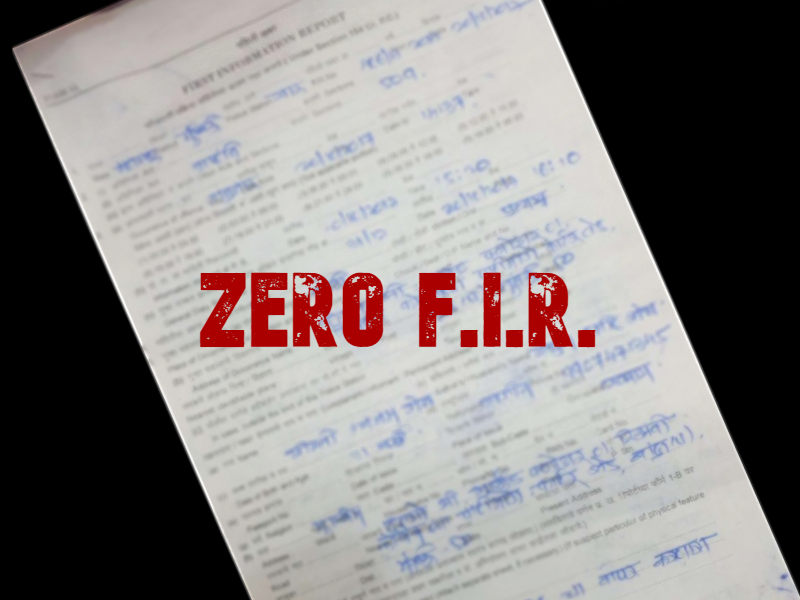This provision was established based on the advice of the Justice Verma Committee, which was convened following the heinous Nirbhaya gang rape case in Delhi in 2012.

Zero FIR: An Accessible First Step in Filing Complaints
Zero FIR (First Information Report) is a legal mechanism that allows individuals to report a crime without being limited by the jurisdiction of a specific police station. Here’s a closer look at what distinguishes it from a regular FIR:
1. Versatile Jurisdiction:
- One of the key distinctions is that while a regular FIR is bound by the jurisdiction of the specific police station within which the crime occurred, a zero FIR can be filed in any police station, regardless of where the offence took place. This empowers complainants to promptly initiate the legal process without constraints related to geographical location.
2. The ‘Zero’ Designation:
- Unlike regular FIRs, which are assigned serial numbers, zero FIRs are labeled with the number ‘0.’ This distinctive numbering system simplifies their identification and differentiates them from traditional FIRs.
3. Transfer Process:
- Once a zero FIR is lodged, the responsibility of the police station where it was initially filed is to transfer the complaint promptly to the appropriate police station having the jurisdiction to conduct a thorough investigation. This is a vital step in ensuring that the case is handled by the relevant law enforcement authority.
4. Conversion to Regular FIR:
- Upon being transferred, the police station with the rightful jurisdiction converts the zero FIR into a regular FIR by assigning it a serial number, akin to the standard filing process. This seamless transformation streamlines the legal proceedings.
Zero FIR is a valuable instrument in the realm of law enforcement. It eliminates the need for complainants to navigate complex jurisdictional boundaries, ensuring that no complaint is dismissed merely due to police station location. This mechanism aligns with the broader goal of providing accessible and efficient legal remedies for those seeking justice.

Demystifying the First Information Report (FIR)
A First Information Report (FIR) is pivotal in criminal law and law enforcement. Let’s delve into what exactly an FIR entails and its role in the process:
Understanding FIR:
- At its core, an FIR is a written document meticulously prepared by the police. It comes into existence when the police receive information about a cognizable offence, which essentially means a crime for which the police can arrest without requiring a warrant.
Initiating Investigations:
- The FIR marks the very first step in commencing the investigative process. It serves as a formal trigger that sets in motion a series of actions and inquiries by law enforcement authorities.
Cognizable Offences and FIR Registration:
- Section 154(1) of the Code of Criminal Procedure (CrPC) grants the authority to register an FIR for cognizable offences. This is a crucial provision that empowers the police to initiate investigations into serious criminal activities promptly.
Consequences of Failing to Register an FIR:
- Recognizing the significance of FIRs and the need for their diligent registration, Section 166A was incorporated into the Indian Penal Code (IPC). This legislative move was based on the recommendations of the Justice JS Verma committee.
- Section 166A serves as a legal deterrent, imposing penalties on public servants who fail to record information related to cognizable offences. These penalties can include imprisonment for up to two years and a financial fine.
The FIR, as the foundational document in criminal proceedings, embodies the essence of swift response and diligent investigation in the face of illegal activities. It underscores the importance of immediate action regarding cognizable offences, ensuring that justice is served efficiently and fairly.
In a legal case, State of Andhra Pradesh v. Punati Ramulu and Others[8], a situation arose where a constable declined to register the First Information Report (FIR) from the informant. The informant was the deceased’s nephew and an eyewitness to the crime.
The constable’s refusal was based on jurisdictional constraints. The court took notice of the constable’s failure to fulfil his duty and underscored his legal responsibility to record the information and then forward it to the appropriate police station.
F.A.Q
Q. What is zero FIR
Zero FIR (First Information Report) is a legal mechanism that allows individuals to report a crime without being limited by the jurisdiction of a specific police station.




